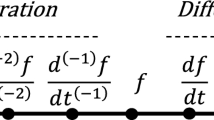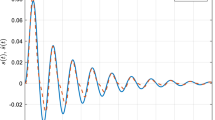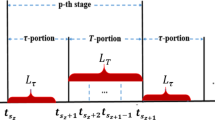Abstract
In real-world applications, faults and delays can occur in all system variables such as inputs and/or states and/or outputs. The challenge of designing Takagi-Sugeno (T–S) fuzzy controllers for faulty and fully delayed systems is addressed. In contrast to most existing works, the system states are assumed to be unavailable for measurement, and no prior information about the system delays and faults as well as their boundaries is required. Furthermore, the time delays are multiple, unknown, and different in each distinct input and/or state and/or output. Because the system states, delays, and faults are unavailable and unknown, the T–S fuzzy controller premise variables become immeasurable. Thus, the design of fuzzy state observers and fuzzy controllers under the presence of all previous uncertainties to ensure overall system stability has become a big challenge. This challenge is solved in two stages. First, a new model for a fully delayed system with different delays in each distinct input, and/or state, and/or output is obtained, which is realized by transforming the fully delayed system into a general delayed model with delayed states and inputs as well as the biasing uncertainties in the sensors. Subsequently, the T–S fuzzy-descriptor systems are investigated, and simultaneous fault-tolerant T–S fuzzy observers–controllers are proposed. The overall stabilities are ensured using the Lyapunov–Krasovskii functional method. Three simulated examples are presented to prove the applicability and advantages of the proposed approach.















Similar content being viewed by others
References
Li H, You F, Wang F, Guan S (2017) Robust fast adaptive fault estimation and tolerant control for T-S fuzzy systems with interval time varying delay. Int J Syst Sci 48:1708–1730
Qiao L, Yang Y (2018) Fault-tolerant control for T–S fuzzy systems with sensor faults: application to a ship propulsion system. J Franklin Inst 355:4854–4872
Han J, Zhang H, Wang Y, Liu X (2016) Robust state/fault estimation and fault tolerant control for T–S fuzzy systems with sensor and actuator faults. J Franklin Inst 353:615–641
Wu Y, Dong J (2019) Local stabilization for discrete-time T–S fuzzy time-delay systems with sensor fault. Fuzzy Sets Syst 374:115–137
Aslam MS, Zhou X, Dai X (2021) Robust reliable filter design for T–S fuzzy singular systems with random time delays under uncertain parameters. Soft Comput 25:4963–4978
Li H, Wang Y, Yao D, Lu RA (2018) Sliding mode approach to stabilization of nonlinear Markovian jump singularly perturbed systems. Automatica 97:404–413
Zhao Y, Wang J, Yan F, Shen Y (2019) Adaptive sliding mode fault-tolerant control for type-2 fuzzy systems with distributed delays. Inf Sci 473:227–238
Rong N, Wang Z, Ding S, Zhang H (2018) Interval type-2 regional switching T–S fuzzy control for time-delay systems via membership function dependent approach. Fuzzy Sets Syst 374:152–169
Chibani A, Chadli M, Ding SX, Braiek NB (2018) Design of robust fuzzy fault detection filter for polynomial fuzzy systems with new finite frequency specifications. Automatica 93:42–54
Wei Y, Qiu J, Lam H-K (2017) A novel approach to reliable output feedback control of fuzzy-affine systems with time delays and sensor faults. IEEE Trans Fuzzy Syst 25:1808–1823
Wei Y, Qiu J, Karimi HR (2018) Fuzzy-affine-model-based memory filter design of nonlinear systems with time-varying delay. IEEE Trans Fuzzy Syst 26:504–517
Hassani H, Zarei J, Razavi-Far R, Saif M (2019) Robust interval type-2 fuzzy observer for fault detection of networked control systems subject to immeasurable premise variables. IEEE Syst J 13:2954–2965
Kim HJ, Park JB, Joo YH (2018) Sampled-data H∞ fuzzy observer for uncertain oscillating systems with immeasurable premise variables. IEEE Access 6:58075–58085
Sabbaghian-Bidgoli F, Farrokhi M (2021) Sensor and actuator fault-tolerant control based on fuzzy unknown input observer: a polynomial fuzzy approach. Appl Soft Comput 110:107747
Quadros MM, Leite VJS, Palhares RM (2022) Robust fault hiding approach for T–S fuzzy systems with unmeasured premise variables. Inf Sci 589:690–715
Hassani H, Zarei J, Chadli M (2017) Qiu J (2017) unknown input observer design for interval type-2 T–S fuzzy systems with immeasurable premise variables. IEEE Trans Cybern 47:2639–2650
Brahim IH, Mehdi D, Chaabane M (2018) Robust fault detection for uncertain T–S fuzzy system with unmeasurable premise variables: descriptor approach. Int J Fuzzy Syst 20:416–425
Aslam MS, Chen Z (2019) Observer-based dissipative output feedback control for network T–S fuzzy systems under time delays with mismatch premise. Nonlinear Dyn 95:2923–2941
Zhao T, Dian S (2017) Fuzzy dynamic output feedback H∞ control for continuous-time T-S fuzzy systems under imperfect premise matching. ISA Trans 70:248–259
Ouhib L (2020) State and unknown inputs estimation for Takagi–Sugeno systems with immeasurable premise variables: proportional multiple integral observer design. Math Comput Simul 167:372–380
Garbouj Y, Dinh TN, Wang Z, Zouari T, Ksouri M, Raїssi T (2020) Robust fault detection for switched Takagi-Sugeno systems with unmeasurable premise variables: interval-observer-based approach. IFAC PapersOnLine 53-2:7947–7952
Dong J, Yang GH (2017) Discrete-time T-S fuzzy systems with partly immeasurable premise variables. IEEE Trans Syst Man Cybern Syst 47:98–110
Dong J, Yang GH (2017) H∞ filtering for continuous-time T–S fuzzy systems with partly immeasurable premise variables. IEEE Trans Syst Man Cybern Syst 47:1931–1940
Dong J, Wang S (2017) Robust H∞ -tracking control design for T–S fuzzy systems with partly immeasurable premise variables. J Franklin Inst 354:3919–3944
Wu Y, Dong J (2018) Fault detection for T–S fuzzy systems with partly unmeasurable premise variables. Fuzzy Sets Syst 338:136–156
Wei Z, Ma Y (2021) Robust H∞ observer-based sliding mode control for uncertain Takagi–Sugeno fuzzy descriptor systems with unmeasurable premise variables and time-varying delay. Inf Sci 566:239–261
Wu Y, Dong J (2021) Local stabilization of continuous-time t–s fuzzy systems with partly measurable premise variables and time-varying delay. IEEE Trans Syst Man Cybern Syst 51:326–338
Nagamani G, Karthika C, Joo YH (2020) Event-triggered observer-based sliding mode control for T-S fuzzy systems via improved relaxed-based integral inequality. J Franklin Inst 357:9543–9567
Nguyen A-T, Pan J, Guerra T-M, Blandeau M, Zhang W (2020) Designing fuzzy descriptor observer with unmeasured premise variables for head-two-arms-trunk system. IFAC PapersOnLine 53-2:8007–8012
Zhou Q, Zhao S, Li H, Lu R, Wu C (2019) Adaptive neural network tracking control for robotic manipulators with dead zone. IEEE Trans Neural Netw Learn Syst 30:3611–3620
Li H, Zhao S, He W, Lu R (2019) Adaptive finite-time tracking control of full state constrained nonlinear systems with dead-zone. Automatica 100:99–107
Tahoun AH (2020) Fault tolerant control for a class of quantized networked control of nonlinear systems with unknown time-varying sensor faults. Int J Control 93:619–628
Tahoun AH (2020) A new unmatched-disturbances compensation and fault-tolerant control for partially known nonlinear singular systems. ISA Trans 104:310–320
Huang S-J, Yang G-H (2014) Fault tolerant controller design for T–S fuzzy systems with time-varying delay and actuator faults: a K-step fault-estimation approach. IEEE Trans Fuzzy Syst 22:1526–1540
Gao Z, Shi X, Ding SX (2008) Fuzzy state/disturbance observer design for T–S fuzzy systems with application to sensor fault estimation. IEEE Trans Syst Man Cybern—Part B: Cybern 38:875–880
Aouaouda S, Chadli M, Karimi H-R (2014) Robust static output-feedback controller design against sensor failure for vehicle dynamics. IET Control Theory Appl 8:728–737
Shen Q, Jiang B, Shi P (2014) Adaptive fault diagnosis for T-S fuzzy systems with sensor faults and system performance analysis. IEEE Trans Fuzzy Syst 22:274–285
Kharrat D, Gassara H, El Hajjaji A, Chaabane M (2018) Adaptive observer and fault tolerant control for Takagi-Sugeno descriptor nonlinear systems with sensor and actuator faults. Int J Control Autom Syst 16:972–982
Cai X, Zhong S, Wang J, Shi K (2020) Robust H∞ control for uncertain delayed T-S fuzzy systems with stochastic packet dropouts. Appl Math Comput 385:125432
Tahoun AH (2017) A new online delay estimation-based robust adaptive stabilizer for multi-input neutral systems with unknown actuator nonlinearities. ISA Trans 70:139–148
Cheng Y, Hu T, Li Y, Zhang X, Zhong S (2021) Delay-dependent consensus criteria for fractional-order Takagi-Sugeno fuzzy multi-agent systems with time delay. Inf Sci 560:456–475
Liao X, Liu Z, Chen CLP, Zhang Y (2022) Event-triggered fuzzy control for nonlinear time-delay system with full-state constraints and unknown hysteresis. J Franklin Inst 359:1582–1611
Yang Z, Zhang X, Zong X, Wang G (2020) Adaptive fuzzy control for non-strict feedback nonlinear systems with input delay and full state constraints. J Franklin Inst 357:6858–6881
Tahoun AH (2015) Adaptive stabilization of neutral systems with nonlinear perturbations and mixed time-varying delays. Int J Adapt Control Signal Process 29:1328–1340
Cai X, Shi K, She K, Zhong S, Wang J, Yan H (2022) New results for T-S fuzzy systems with hybrid communication delays. Fuzzy Sets Syst 438(2022):1–24
Ko K S, Lee W I, Park P, Sung D.K (2018) Delays-dependent region partitioning approach for stability criterion of linear systems with multiple time-varying delays. Automatica 87: 389–394
Tahoun AH (2017) Less-conservative robust adaptive control of neutral systems with mixed time-delays. Int J Syst Sci 48:675–685
Yang J, Liu X, Sun J, Li S (2022) Sampled-data robust visual servoing control for moving target tracking of an inertially stabilized platform with a measurement delay. Automatica 137:110105
Shen S, Song A, Li H, Li T (2022) Cascade predictor for a class of mechanical systems under large uncertain measurement delays. Mech Syst Signal Process 167:108536
Waseem UB, Tahir F, Rehan M, Ahmad S (2021) A novel delay-range-dependent observer-based control approach for one-sided Lipschitz systems under measurement delays. Eur J Control 61:24–39
Qiad J, Li X, Jianwei Xu J (2019) A composite disturbance observer and H1 control scheme for flexible spacecraft with measurement delay and input delay. Chin J Aeronaut 32:1472–1480
Zhou Q, Xu X, Liu L, Feng G (2021) Output feedback stabilization of linear systems with infinite distributed input and output delays. Inf Sci 576:54–67
Li M, Shu F, Liu D, Zhong S (2018) Robust H∞ control of T-S fuzzy systems with input time-varying delays: a delay partitioning method. Appl Math Comput 321:209–222
Kharitonov LV (2017) Prediction-based control for systems with state and several input delays. Automatica 79:11–16
Zhou B, Liu Q, Mazenc F (2017) Stabilization of linear systems with both input and state delays by observer–predictors. Automatica 83:368–377
Mao D, Ma Y (2022) Dissipativity analysis for Takagi–Sugeno fuzzy system with time-varying delays and stochastic packet dropouts. Inf Sci 587:535–555
Cacace F, Germani A (2017) Output feedback control of linear systems with input, state and output delays by chains of predictors. Automatica 85:455–461
Chiu C-S, Chiang T-C (2017) H∞ output-feedback fuzzy proportional-integral control of fully delayed input/output systems. ISA Trans 66:22–31
Han X, Cheng N, Fu L, Ma Y (2018) Observer-based finite-time H∞ control of the T–S fuzzy system with time-varying delay and output constraints. Comput Appl Math 37:6176–6197
Tsai SH (2016) Robust H∞ stabilization conditions for a class of uncertain T–S fuzzy neutral systems with disturbance. Neurocomputing 193:68–80
Zhang J, Swain AK, Nguang SK (2016) Robust observer-based fault diagnosis for nonlinear systems using MATLAB. Springer international publishing, Switzerland ISBN: 978-3-319-32323-7
Author information
Authors and Affiliations
Corresponding author
Ethics declarations
Conflict of interest
There are no conflicts of interest.
Additional information
Publisher’s note
Springer Nature remains neutral with regard to jurisdictional claims in published maps and institutional affiliations.
Rights and permissions
Springer Nature or its licensor holds exclusive rights to this article under a publishing agreement with the author(s) or other rightsholder(s); author self-archiving of the accepted manuscript version of this article is solely governed by the terms of such publishing agreement and applicable law.
About this article
Cite this article
Tahoun, A.H., Arafa, M. Descriptor-based T–S fuzzy fault-tolerant control for delayed systems with immeasurable premise variables. Appl Intell 53, 14579–14601 (2023). https://doi.org/10.1007/s10489-022-04234-4
Accepted:
Published:
Issue Date:
DOI: https://doi.org/10.1007/s10489-022-04234-4




